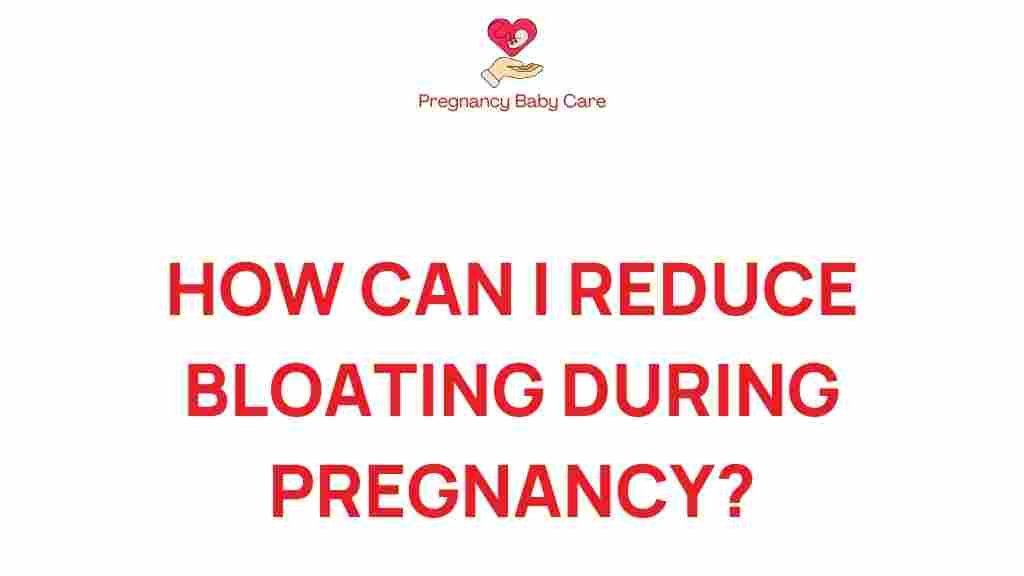Unraveling the Mystery: How to Combat Bloating During Pregnancy
Bloating is a common yet uncomfortable experience for many expectant mothers. As the body undergoes significant changes during pregnancy, digestive health can often take a backseat, leading to feelings of discomfort and frustration. Understanding the causes of bloating and exploring effective remedies can empower you to make informed decisions about your wellness throughout this exciting journey. In this article, we will delve into the reasons behind bloating during pregnancy, offer practical solutions, and provide nutritional advice to help alleviate discomfort.
Understanding Bloating During Pregnancy
Bloating is typically characterized by a feeling of fullness or swelling in the abdomen. For pregnant women, this can be caused by a variety of factors:
- Hormonal Changes: The surge in hormones, particularly progesterone, can slow down digestion, leading to increased gas and bloating.
- Growing Uterus: As the uterus expands, it exerts pressure on the intestines, which can disrupt normal digestive processes.
- Dietary Changes: Expectant mothers often change their eating habits, which can include higher intake of fiber or new foods that may cause gas.
- Constipation: Pregnancy hormones can lead to constipation, compounding bloating and discomfort.
Step-by-Step Process to Alleviate Bloating
Combating bloating during pregnancy requires a multifaceted approach. Here’s a step-by-step guide to help you manage this common issue:
1. Adjust Your Diet
Nutrition plays a crucial role in digestive health. Consider the following dietary adjustments:
- Eat Smaller Meals: Instead of three large meals, opt for five to six smaller meals throughout the day to reduce pressure on your digestive system.
- Limit Gas-Producing Foods: Foods like beans, broccoli, onions, and carbonated beverages can increase bloating. Keep track of what triggers your discomfort.
- Stay Hydrated: Drink plenty of water to aid digestion and combat constipation.
- Incorporate Probiotics: Foods like yogurt and kefir can support gut health and may alleviate bloating.
2. Stay Active
Physical activity can improve digestion and reduce bloating. Here are some ideas:
- Gentle Exercise: Activities like walking, swimming, or prenatal yoga can help stimulate digestion.
- Avoid Prolonged Sitting: If you have a sedentary job, take breaks to stand up and stretch.
3. Practice Relaxation Techniques
Stress can exacerbate digestive issues. To promote wellness, try:
- Deep Breathing Exercises: Slow, deep breaths can help relax your body and reduce stress.
- Meditation: Mindfulness practices can improve overall well-being and may help with digestive health.
4. Consider Supplements
Consult with your healthcare provider about the following:
- Digestive Enzymes: These can help break down food more effectively, reducing bloating.
- Fiber Supplements: If you’re struggling with constipation, a fiber supplement may ease your discomfort.
Troubleshooting Common Issues
If you’ve made dietary and lifestyle changes but still experience bloating, consider these troubleshooting tips:
1. Keep a Food Diary
Tracking what you eat can help you identify specific foods that trigger bloating. Note any symptoms and discuss these with your healthcare provider.
2. Consult a Healthcare Professional
If bloating is severe or persistent, it’s important to consult a healthcare professional. They can rule out any underlying conditions and provide personalized advice.
3. Stay Informed About Your Body
Understanding the changes occurring in your body during pregnancy can help you manage your expectations and reduce anxiety. Knowledge is power when it comes to your health.
Nutritional Focus for Digestive Health
Maintaining good nutrition is essential for combating bloating and supporting your overall wellness during pregnancy. Here are some key nutrients to focus on:
- Fiber: Helps maintain regular bowel movements. Incorporate whole grains, fruits, and vegetables into your diet.
- Magnesium: Found in nuts, seeds, and leafy greens, magnesium can help reduce bloating by supporting muscle function in the digestive tract.
- Potassium: Eating potassium-rich foods like bananas and sweet potatoes can help balance fluids in your body.
- Probiotics: As mentioned earlier, probiotics can enhance gut health, which is crucial during pregnancy.
Wellness Practices for Expectant Mothers
Beyond dietary changes, incorporating wellness practices can enhance your overall experience during pregnancy:
- Self-Care: Make time for relaxation and activities you enjoy. Stress management can positively affect your digestive health.
- Regular Prenatal Care: Attend all scheduled prenatal appointments to monitor your health and address any concerns with your healthcare provider.
- Hydration: Keep a water bottle handy to ensure you stay hydrated throughout the day.
Conclusion
Bloating during pregnancy can be uncomfortable, but by understanding its causes and implementing effective remedies, expectant mothers can find relief. Focus on nutrition, stay active, and practice relaxation techniques to enhance your digestive health and overall wellness. Remember, every pregnancy is unique, and it’s essential to communicate openly with your healthcare provider about any persistent discomfort.
For more in-depth resources on prenatal care and wellness, check out this guide.
By taking proactive steps and listening to your body, you can navigate the challenges of bloating and enjoy a healthier, more comfortable pregnancy.
This article is in the category Pregnancy and created by PregnancyBabyCare Team
